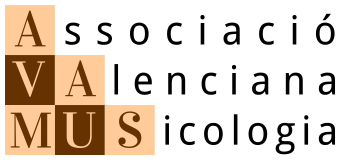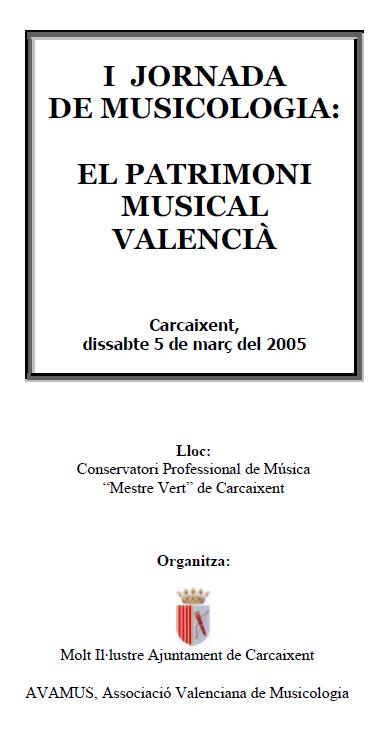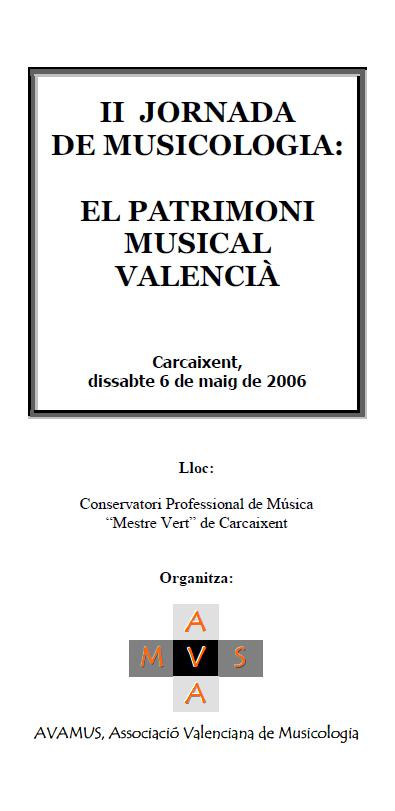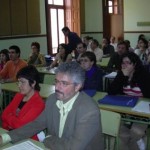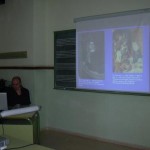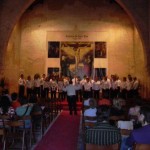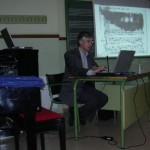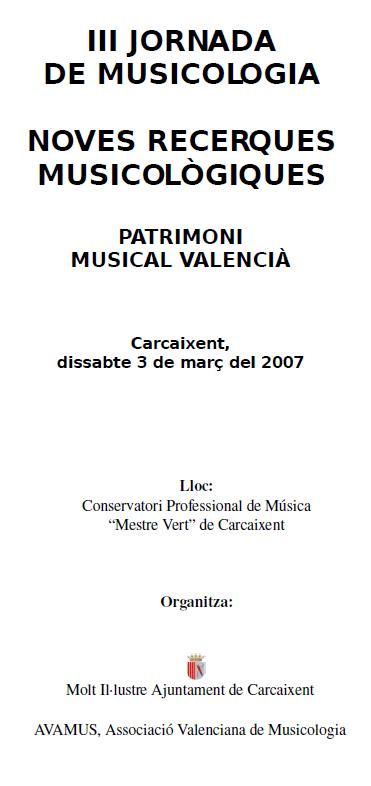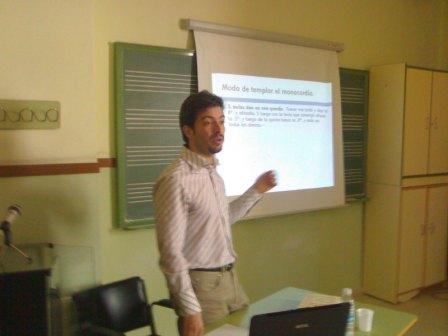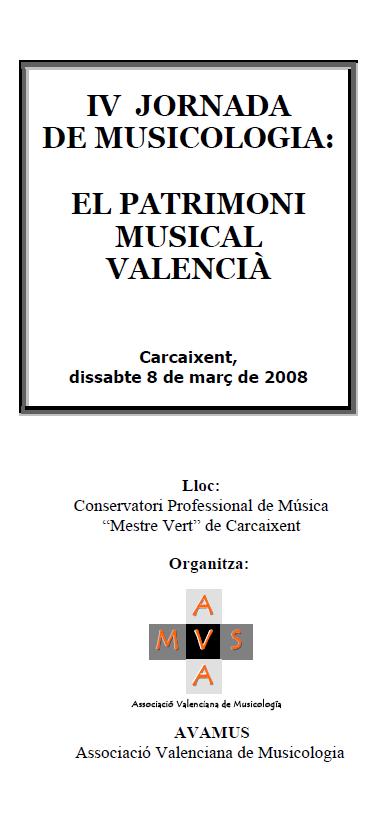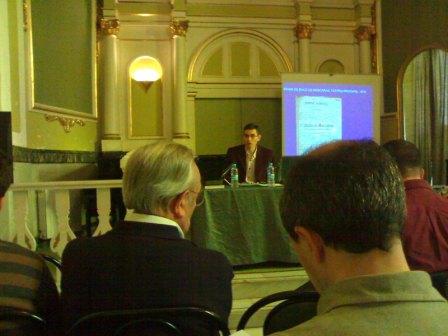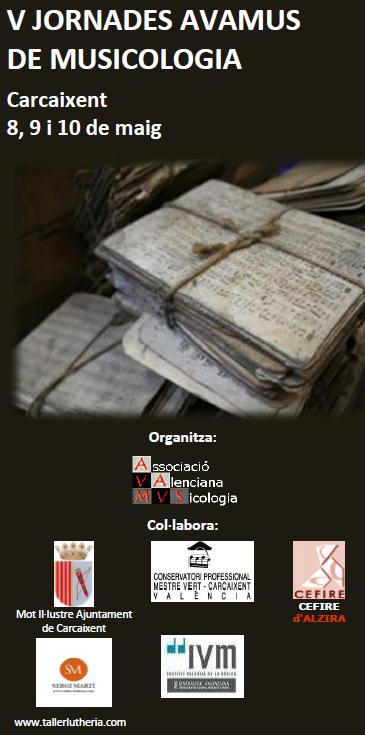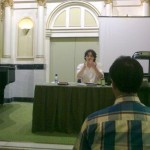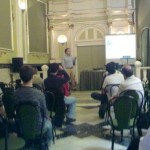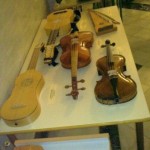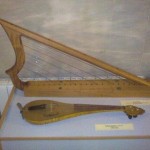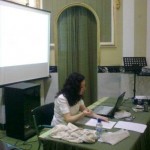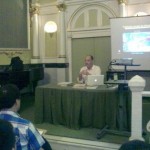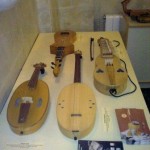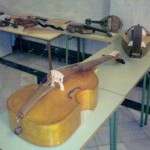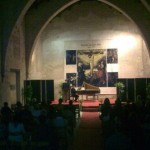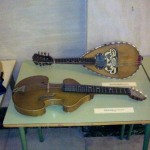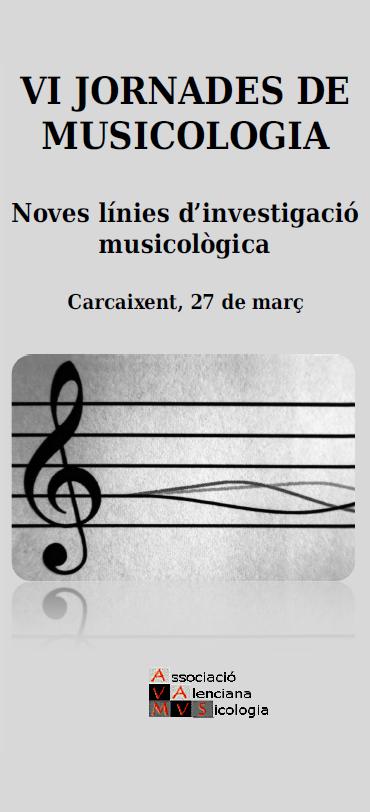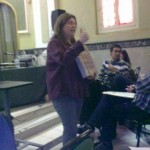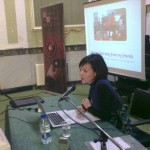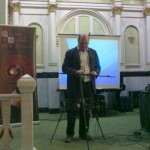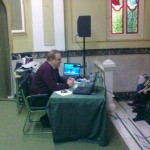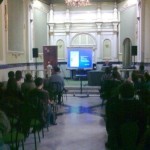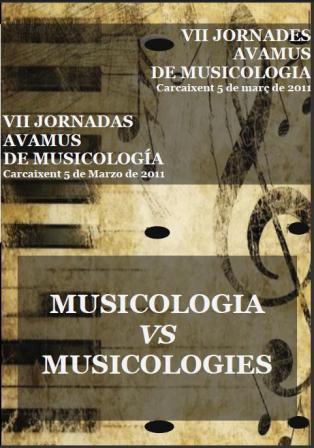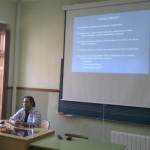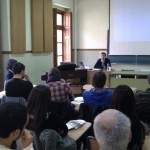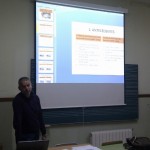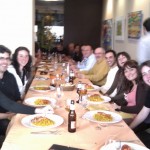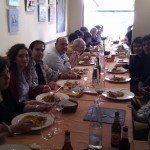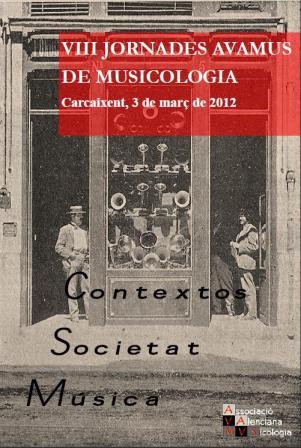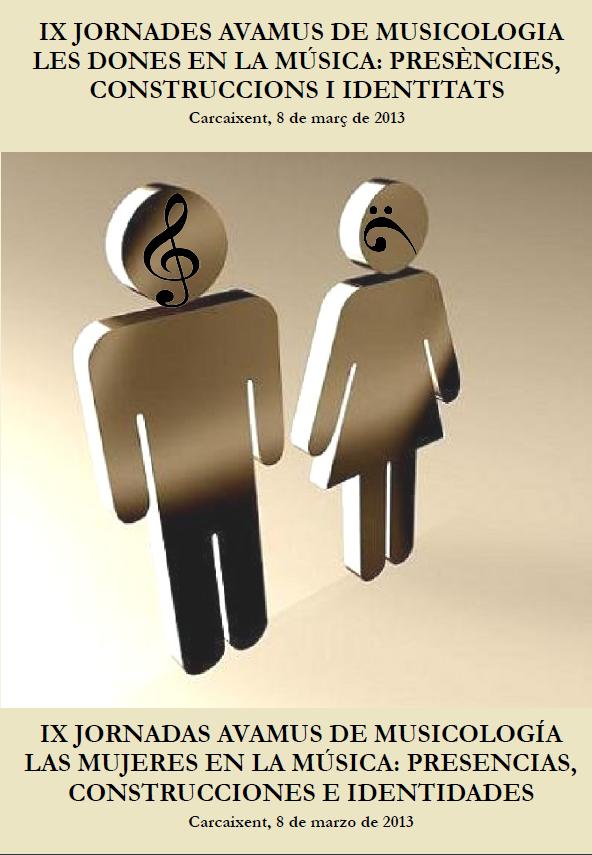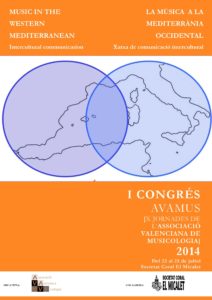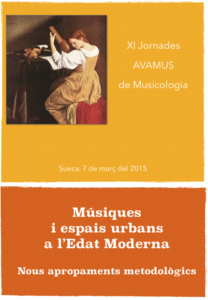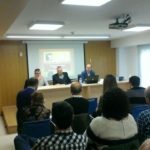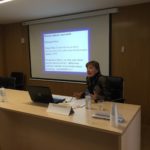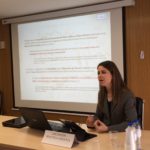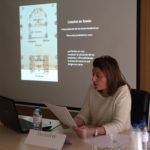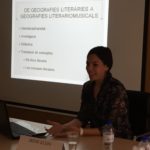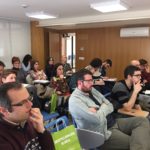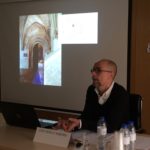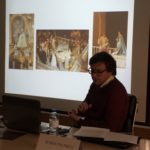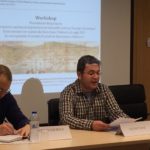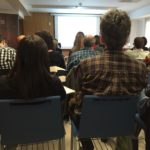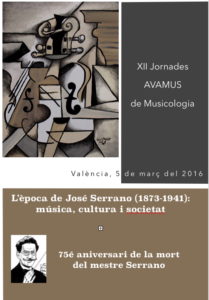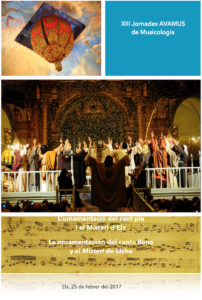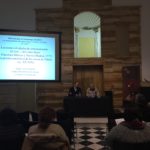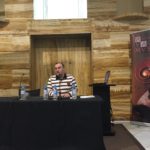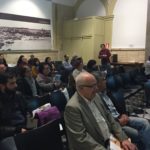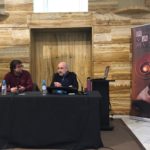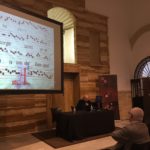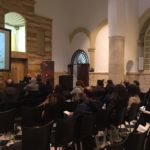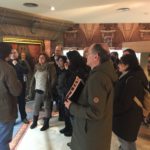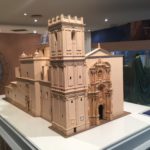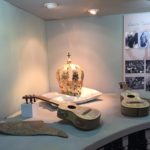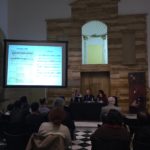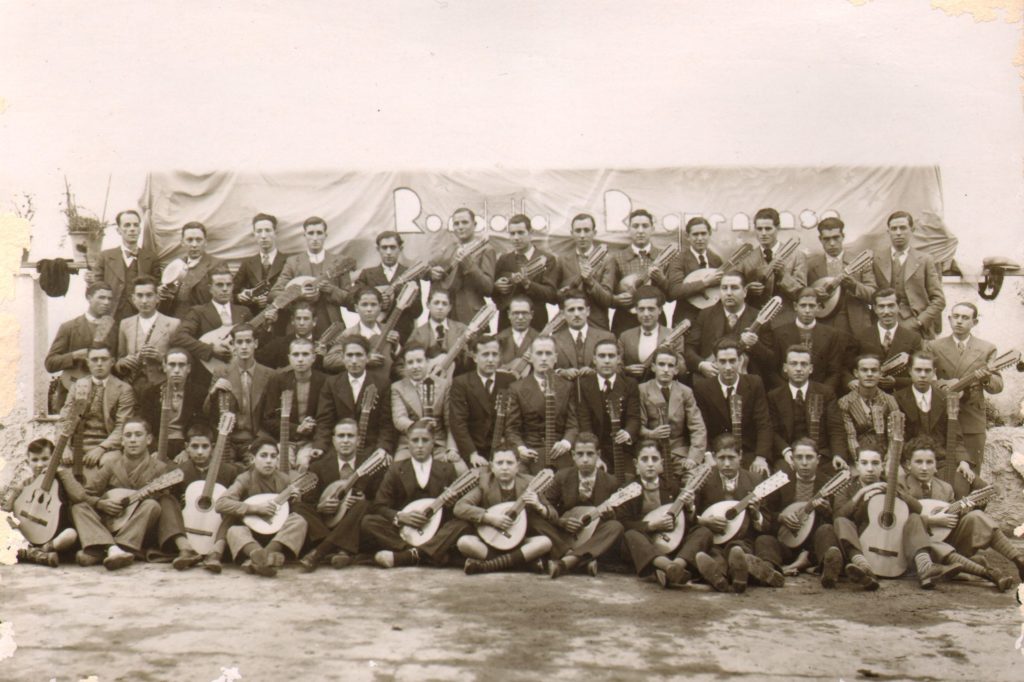Every year, since 2005, AVAMUS organizes a working day of Musicology, wich is the reference event of the association. The main objectives are, among other things, let people know the Valencian musical heritage.
Click on the image to see the complet program of the working day.
I Jornada
II Jornada
III Jornada
IV Jornada
V Jornada
VI Jornada
VII Jornada
VIII Jornada
IX Jornada
X Round: I International Congress AVAMUS
XI Jornada
XII Jornada
XIII Jornada
XIV Jornada
XV Round: II International Congress AVAMUS
XVI Jornada
XVII Jornada
XVIII Jornades
XVIII Jornada (parte II)
XIX Jornada
XX Round: III Internacional Congress AVAMUS
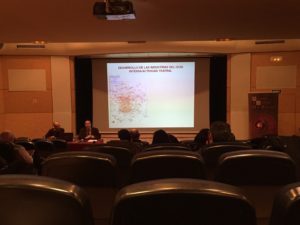
Prof. Víctor Sánchez
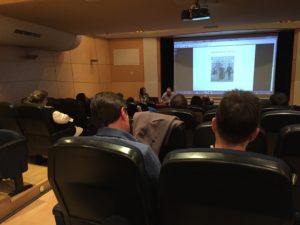
Prof. Rafael Díaz
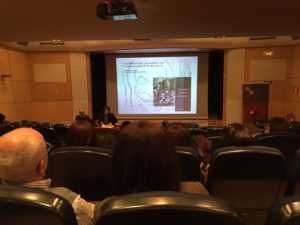
Prof. Javier Suárez-Pajares
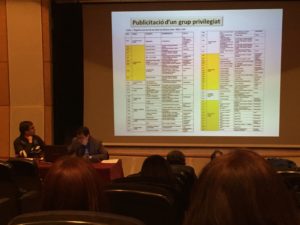
Prof. Ramon Ahulló Hermano
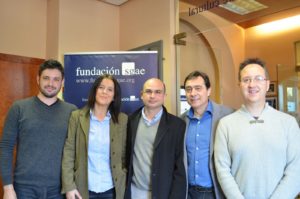
From left to right: Juanma Ferrando (Treasurer), Ma. Amparo Tomàs (Secretary), Abel Puig (President), Ramon Ahulló (Doctoral thesis from el Mestre Serrano and member) and Ramon Canut (former president).
XIII Jornades de Musicologia AVAMUS (Working Day)
The ornamentation of Plain Chant and the Mystery Play of Elche
Elx (Alacant, Spain). Centre Cultural de Les Clarisses. Passeig de les Eres de Santa Llúcia, 14.
he art of melody ornamentation is a practice as old as the own liturgical songs. However, this art was gradually banished from the late 19th Century due the new guidelines established by Solesmes reformation. The target of this study day is to reflect, guided by two specialists as Marcel Pérès and Juan Carlos Asensio, on procedures and performing ways. These practices, nowadays almost forgotten, have reached today in living testimonials like Mystery Play of Elche.
The Study Day is scheduled in two phases: More theoretical at the morning and another more practical through a round table and the performing by singers of Mystery.
Marcel Pérès will talk on “The Ornamentation of Plainchant and Polyphony: past, present and future”. The ornamentation was always at the core of musical practice, although it was only made evident in the 19th Century through aesthetic choices. In spite of problems on ornamentation have reappeared as a musicological issue since 1970s with the revival of Baroque music, the practice of ornamentation in chant plain and polyphony –both Medieval and Renaissance– is still used hardly ever. Pérès will discuss about different perspectives to approaching to the evolution of this practice from the observation and study of some living traditions.
Juan Carlos Asensio in his speech “Lecciones olvidadas de ornamentación: El arte de canto llano de Francisco Marcos y Navas (Madrid 1777) y la práctica melódica de los seises de Todelo (siglos XV-XIX)” will focus on the aspects of forgotten ornamentations and old practices from these two examples that we will resume in the afternoon roundtable.
The afternoon session will try to combine theory and practice, so that will discuss several aspects discussed previously with the collaboration of the singers, who will interpret the settings: Ternari, María, Ángel, Araceli and Coronation of the Mistery Play of Elche.
At the end, it will award III AVAMUS Musicology Prize, an honorary award given by AVAMUS (Valencian Association of Musicology) every three years and which recognizes the musicological trajectory of a scholar or institution that has contributed to a significant diffusion of the Valencian musical heritage.
Slideshow by Juan Carlos Asensio
XIII AVAMUS Working Days 2017 – PDF Events Program
Music from the rural environment as an example of social interaction: groupings, identities and spaces of coexistence
In commemoration of the 25th anniversary of the death of the musician and historian requenense Rafael Bernabeu López (1903-1993), founder and director of the Rondalla and Choirs of Requena
Cultural Space Feliciano A. Yeves (Arrabal Av., 9 – REQUENA). Downtown
April 21-22, 2018
The XIV edition of the AVAMUS Musicology Conference will be held in the city of Requena (Valencia) in collaboration with ASREMUS (Requenense Association of Musicology), in order to commemorate the 25th anniversary of the death of Rafael Bernabeu López (1903-1993), chronicler of the city, historian, teacher, composer, founder and director of the Rondalla and Coros de Requena.
The celebration of this anniversary, as well as the holding of the Conference in a town in the interior of the province of Valencia that enjoys a huge musical tradition in many aspects (folkloric, academic, rondallístico, bandístico, etc.), and that in the currently maintains band, rondalla, choir and orchestra, and several folkloric groups of reference in the Valencian Community, has led to propose the theme of this meeting.
The rural environment, treated as a clear example of social interaction, invites musicological reflection and offers the opportunity to treat the musical phenomenon from different points of view. Therefore, the objective of this conference is focused on the study of musical groups of different origins, the construction of personal and cultural identities, the spaces of coexistence that constitute societies and musical associations, organology and groups, study groups, music schools, conservatories, folklore, archives, history, etc., from interdisciplinary points of view and, up to a point, little studied so far (serve as an example the rare attention given so far to the round-the-clock phenomenon, so widespread in the Community Valenciana, which lacks historiographical works or that remain unpublished, and which, along with other topics of similar interest, will be treated in these days).
The conference is organized around eight thematic conferences: José Luis Temes (orchestra director, writer, National Music Prize 2009), will speak about «Five people composers», from his anecdote book «Quisiera ser tan alto…»; Jorge Orozco (guitarist and professor at the Professional Conservatory of Torrent), will illustrate «The Turia Quintet», a group of pulse and prong that contributed in a masterful way to the dignification of these instruments; José Prieto Marugán (journalist and music critic, programming partner on Radio Nacional), will discuss the characteristics and peculiarities of «La Zarzuela rural, local and regional»; Pedro Chamorro Martínez (concertist, composer and professor of plectrum instruments), will show his vision on «The music of plectrum in concert halls and conservatories coexisting with the music of pulse and prong in the rural world», in a few days in which pulse and barb instruments will be very present; Marcial García Ballesteros (musicologist, historian, president of ASREMUS), will remember the vocal and round group “Rondalla and Coros de Requena” and its founder and director, Rafael Bernabeu López, on the 25th anniversary of his death; Salvador Astruells Moreno (doctor in musicology for his thesis on the Municipal Band of Valencia), will speak about “Bandic competitions in the Valencian towns”, showing the diversity of bands competitions in the rural environment as an imitation or replica of the model of the city of Valencia; Beatriz Cancela Montes (Ph.D. in musicology for her thesis on the Municipal Band of Santiago de Compostela, will come from Galicia to present the “Bands of Music in the Galician rural environment, the example of the Municipal Band of Santiago de Compostela”, as model alien to Valencia where the bands also have their importance and, finally, Fermín Pardo Pardo (folklorist, official journalist of Requena, «Honorary Musicology Award AVAMUS 2017»), will deal with an interesting and forgotten topic: «The importance of Accordion as musical support in parties and social events in the interior of Valencia and Cuenca».
SCHEDULES
Saturday, April 21st
Morning (Yeves Space)
09:00 – 09:45 Acreditaciones y café / Acreditacions i cafè
09:45 – 10:00 Presentación e introducción / Presentació i Introducció
10:00 – 11:00 JOSÉ LUIS TEMES RODRÍGUEZ: «Recuerdo de cinco compositores de pueblo».
11:00 – 11:20 Descanso / Descans (20’)
11:20 – 12:20 JORGE OROZCO: «El Quinteto Turia, del taller artesano al palacio real».
12:20 – 12:35 Descanso / Descans (15’)
12:35 – 13:50: Comunicaciones libres (20′ + 5′ para preguntas) / Comunicacions lliures
12:35 – 13:00 Comunicación 1 / Comunicació 1
LESLIE FREITAS DE TORRES: «De escuela de música a conservatorio: los ciento cuarenta años de educación musical a través de la Real Sociedad Económica de Amigos del País de Santiago de Compostela (1877-2017)».
13:00 – 13:25 Comunicación 2 / Comunicació 2
ALEXANDRE JOSÉ DE ABREU: «Late 19thy century musical activity in Säo Paulo: the move from rural to metropolitan (Actividad musical en Sao Paulo a finales del siglo XIX: el paso de rural a metropolitana)».
13:25 – 13:50 Comunicación 3 / Comunicació 3
SAMUEL DIZ: «Gondomar: El origen de Germán Lago».
13:50 – 14:00 Descanso / Descans (10’) Traslado al lugar del Catering.
14:00 – 16:00 COMIDA / DINAR
Restaurante Alejo (Avda. Estación, 2). Con Vinos (obsequio de Coviñas) y agua (obsequio de Aguas de San Benedetto). Exclusivamente para participantes que contraten el menú de las Jornadas.
Afternoon (Yeves Space)
16:00 – 17:00 JOSÉ PRIETO MARUGÁN: «La Zarzuela Rural, Local y Regional. Características y peculiaridades. La labradora (Romero/Fernández-Shaw y Magenti) como modelo».
17:00 – 17:10 Descanso / Descans (10’)
17:10 – 18:10 PEDRO CHAMORRO MARTÍNEZ: «La música de plectro en salas de concierto y conservatorios coexistiendo con la música de pulso y púa en el mundo rural».
18:10 – 18:20 Descanso / Descans (10’)
18:20 – 19:20 MARCIAL GARCÍA BALLESTEROS: «La Rondalla y Coros de Requena. Una agrupación concertística inusual a los veinticinco años de la muerte de su fundador, Rafael Bernabeu López».
19:20 – 19:30 Descanso / Descans (10’) Traslado al Auditorio de la Sociedad Musical “Santa Cecilia”.
19:30 – 21:00 CONCIERTO / CONCERT
Orquesta de Pulso y Púa y Coro de la Escuela Rondalla S. M. de Requena. Director: Francisco Martínez Martínez. Obras de Rafael Bernabeu López (1903-1993). Sala Auditorio de la Sociedad Musical «Santa Cecilia». Entrada gratuita para los participantes en las Jornadas (Programa en Sala).
Sunday, April 22
Morning (Yeves Space)
09:45 – 10:00 Acreditaciones y café / Acreditacions i cafè
10:00 – 11:00 SALVADOR ASTRUELLS MORENO: «Concursos Bandísticos en los pueblos valencianos. A la sombra de Valencia».
11:00 – 11:20 Descanso / Descans (20’)
11:20 – 12:20 BEATRIZ CANCELA MONTES: «Bandas de Música en el entorno rural gallego. El ejemplo de la Banda Municipal de Santiago de Compostela».
12:20 – 12:30 Descanso / Descans (10’)
12:30 – 13:45 Comunicaciones Libres (20’ + 5’ para preguntas) / Comunicacions lliures
12:30 – 12:55 Comunicación 4 / Comunicació 4
ELSA CALERO CARRAMOLINO: «Folklorismo carcelario: ¿identidad nacional o manual de subversión?».
12:55 – 13:20 Comunicación 5 / Comunicació 5
MARCO ANTONIO DE LA OSSA: «Ángel, musa y duende: Federico García Lorca, la investigación musical y las Canciones Populares Españolas».
13:20 – 13:45 Comunicación 6 / Comunicació 6
RAMÓN AHULLÓ HERMANO: «Sueca como dechado de la actividad musical local durante el primer tercio del siglo XX».
13:45 – 14:00 Descanso / Descans (15’) Traslado al lugar del Catering.
14:00 – 16:00 COMIDA / DINAR
Restaurante Alejo (Avda. Estación, 2). Con Vinos obsequio de Coviñas y agua obsequio de Aguas de San Benedetto. Exclusivamente para participantes que contraten el menú de las Jornadas.
Afternoon (Yeves Space)
16:15 – 17:15 FERMÍN PARDO PARDO: «La importancia del Acordeón como soporte musical en fiestas y acontecimientos sociales del interior de Valencia».
17:15 – 17:30 Entrega del III PREMI HONORÍFIC DE MUSICOLOGIA «AVAMUS» 2017 a FERMÍN PARDO PARDO (Abel Puig Gisbert, presidente de AVAMUS).
17:30 – 17:45 Clausura de las Jornadas / Clausura de les jornades
17:45 – 18:15 Descanso / Descans (30’) Traslado al Teatro Principal de Requena.
18:15 – 20:15 CONCIERTO / CONCERT
Banda Sinfónica de la Sociedad Musical «Santa Cecilia» de Requena: «Compositores del pueblo para el pueblo». Concierto de autores valencianos de los ss. XIX al XXI. Director: Sergio Navarro Bonaviña. Teatro Principal de Requena. Entrada gratuita para los participantes en las jornadas (programa en Sala).
REGISTRATION
Registration is priced at € 40 for the general public and € 25 for AVAMUS and ASREMUS members (includes attendance at the days and concerts). On the same day you can hire a € 15 menu arranged for the day. The registration period will remain open until April 16, 2018. To formalize the registration, you must make an entry (of € 40 or € 25, as appropriate) to the account number ES70 2100 4578 98 0200029972 of La Caixa. You will have to send an e-mail with the transfer receipt and your name and surnames to musicologia.avamus@gmail.com (please indicate in the same email if you want the menu for the first day, the second day, both or none , in order to reserve the corresponding premises, and that will only be paid on the same day without having to make any advance payment).
HOW TO ARRIVE
Requena accessed via the following routes:
Highway
- Nacional III Madrid-Valencia.
- Autovía Madrid-Valencia (A3).
- Nacional 332, Valencia-Córdoba.
- Nacional 330, Murcia-Zaragoza.
- Ferrocarril Madrid-Valencia.
Trains
- “Cercanías” Line
You can chech the schedules on http://www.renfe.es
Tel.: 902320320
Requena’s train station is at the crossroad between Capitán Gadea Av. and Estación Av..
- AVE
You can check the schedules on http://www.renfe.es
Tel.: 902320320
AVE station is located in San Antonio (5’5 km. from Requena).
Bus
- Autobuses Monbus
Regular services in Valencia, Albacete, Cuenca, etc.
Tel.: 902292900
e-mail: monbus@monbus.es
web: www.monbus.es / http://horarios.monbus.es
- AutoRes
Madrid-Valencia buses
Tel.: 902020052
e-mail: informacion@avanzabus.com
web: www.avanzabus.com
MORE INFORMATION
AVAMUS Coordinator: Abel Puig Gisbert (630733663)
ASREMUS Coordinator: Marcial García Ballesteros (657802300)
ORGANIZES
AVAMUS
ASREMUS
COLLABORATE
M.I. Ayuntamiento de Requena
Sociedad Musical «Santa Cecilia» de Requena
Escuela Rondalla S. M. de Requena
Coviñas, C. V.
The Centenari of the ephemeris:
canons, identities and oblivions
Beethoven 250
AVAMUS – Associació Valenciana de Musicologia
Date: postponed on April 25, 2020 by COVID-19
Casa de la Cultura Marqués de González de Quirós
Passeig Germanies, 13
Gandia (Valencia)
Not to mention Beethoven. An impossible in this year 2020, 250th anniversary of his birth. Cultural activities of all kinds organized around the world and the programming of concert halls and radio stations even create an obvious risk of saturation.
From AVAMUS, we want to propose a tribute to the quasi-mythical hero of European music as an occasion to reflect on the concept itself of commemorating ephemeris.
The prodigious tools of historical memorization produced by our culture, although they do not exclude more or less interested oblivions, have certainly made the celebration of ephemeris a fact in any realm, not only cultural.
However, the celebration of the birthdays of prominent artists and figures in art and culture has a very precise origin, rooted in the processes of nationalization, during the 19th and 20th centuries. That is, the era when literary and artistic canons – which had been formed as repertoires of models to be imitated – were given new significance by authors who included the role of deeper interpreters and builders of cultures. national.
With that premise, birthdays and births, and, increasingly, any other significant date in their biographies, have become especially relevant community-building rituals.
It seems therefore justified to ask about the meaning of both celebrations, in an age like ours, which has seriously challenged artistic canons – even resizing the composer’s role as the main subject of musical creation – and which, politically, must face the challenges of globalization and the reactionary response of sovereignisms.
Speakers
Juan José Carreras – Universidad de Zaragoza
Xavier Andreu Miralles – Universitat de València
Proposals for participation
The day is open to proposals for communication on topics related to the issues mentioned above. The directions included are only a few possibilities.
Beethoven Centenary
- Celebration of previous centenaries (1920, 1927, 1970, 1977).
- Beethoven’s presence in the Valencian music experience and more in general in Spain: concert programming, training and music education or not, popular culture, media, musicological research.
Canon
- Is there a Valencian music canon?
- Valencian musicians in the Spanish music canon.
- Valencian musicians in the European music canon.
Ephemeris
- Hundreds recent (past and future).
Presentation of the proposals
Those interested in participating must send their proposals before Sunday, March 29, 2020, to the following email address:
Proposals should include:
- Title of the proposal.
- Name and surname of the participant.
- Institutional affiliation (if applicable).
- Contact email address.
- Summary of a maximum of 300 words (bibliography included).
Schedule
From 9:30 a.m. to 6:30 p.m.
Registration
- General Audience: € 40
- AVAMUS members: € 25
- Unemployed, under 25 and students: € 20
The registration period will remain open from March 20 to April 20, 2020.
The deposit can be made through two channels:
- Deposit, transfer or bank transfer to the following account number:
ES94 3159 0048 3125 9310 1021 (Caixa Popular)
Concept: Name and Surname(s)
- Via Paypal, through the following link:
Paypal Registration
Concept: Name and Surname(s)
In any case, to formalize the registration, it will be necessary to make the corresponding payment and send an email to musicologia.avamus@gmail.com with the receipt of the entrance and the documentation that it considers appropriate to contribute in the form 3) of registration.
On the same day a menu of € 15 can be contracted for the day.
IV Honorary Award in Musicology
The Musicology Honorary Award is a three-year award instituted in 2010 by the Valencian Association of Musicology that recognizes the musicological trajectory of a person or entity that, for its scientific work, has made a significant contribution to publicizing the musical heritage Valencia. At the end of the day, the 2020 award will be presented, a unique sculpture by Salvador Marco made exclusively for AVAMUS.
Organizing Committee
Andrea Bombi
Juanma Ferrando
Jorge García
Abel Puig
Organize
AVAMUS – Associació Valenciana de Musicologia
Collaborate
Excm. Ajuntament de Gandia

Xàtiva, 1822: capital de província.
La vida musical al primer terç del segle XIX
Dates: 11 i 12 de juny de 2022
Xàtiva – Museu de Belles Arts ‘Casa de l’Ensenyança’
Organitza
AVAMUS – Associació Valenciana de Musicologia
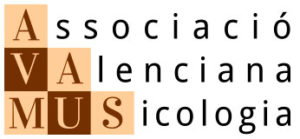
Col·labora
Ajuntament de Xàtiva
Casa de l’Ensenyança
Arxiu Municipal de Xàtiva
Institut Valencià de Cultura – Conselleria d’Educació, Cultura i Esport

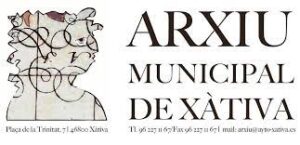

Presentació
La vida efímera de la província de Xàtiva ens parla, 100 anys després, d’un període políticament tèrbol i complexe. Això no va impedir, però, que la vida artística de l’època —i més amplament la corresponent al primer terç del 1800— fos alhora bressol i forment de moltes de les manifestacions musicals que es consolidarien amb posterioritat.
Ponents
Juan José Carreras
Vicente Gabriel Pascual
Juan Carlos Galiano
Programa
Dissabte 11 de Juny
Xàtiva – ‘Casa de l’Ensenyança’
(Com arribar)
09:30 Recepció i acreditacions
10:00 Inauguració
10:15 Conferència inaugural de Juan José Carreras
11:15 Pausa i cafés
11:45 Comunicacións lliures I
11:45 Salvador Astruells Moreno: “Músicas de ayre”
12:15 Frederic Oriola – Mari Àngels Faus: “Francisco Bañeras Torres (1786-1863) músic major del regiment de Ferran VII. L’ofici de músic durant el Trienni Liberal”
12:45 Marcial García Ballesteros:”Primeras manifestaciones bandísticas en la milicia nacional de Requena”
14:00 Dinar Restaurant ‘Els Porxes’ (Com arribar)
17:00 Comunicacions lliures II
17:00 David Gómez Zambrano: “Antecedents i primers anys del fenòmen bandístic a Alaquàs”
17:30 Víctor R. Panach Rosat: “Orígens de la Banda de Música d’Alboraia en la Concòrdia de 1836”
18:00 Conferència a càrrec de Vicente Gabriel Pascual
Diumenge 12 de Juny
Xàtiva – ‘Casa de l’Ensenyança’
(Com arribar)
10:00 Visita guiada a l’Arxiu Municipal (Com arribar)
11:15 Pausa i café
11:45 Comunicacions lliures III
11:45 Héctor Eulogio Santos Conde: “Sacado de un Dúo Serio de Rossini: Benito Lentini y la recepción de ópera italiana en Las Palmas de Gran Canaria entre 1815 y 1846”
12:15 José Gabriel Guaita Gabaldón: “De Gomis a Rossini: panorama y mercado musical en Valencia a partir del Trienio Liberal (1820-1830)”
12:30 Conferència Juan Carlos Galiano
14:30 Dinar de clausura – Restaurant La Talaia del Castell (Com arribar)
17:00 Visita guiada al Castell de Xàtiva (Com arribar)
Inscripció
Per a inscriure’s a la jornada, cal seguir els següents passos:
- Emplenar i enviar el Formulari d’inscripció
- Abonar la quota que corresponga
- Públic General: 40 €
- Socis d’AVAMUS: 25 €
- Estudiants: 20€
- Públic General + quota d’AVAMUS: 45€
- Estudiants + quota d’AVAMUS: 25 € (*)
* Amb aquesta tarifa, els alumnes universitaris o de conservatori superior seran socis d’AVAMUS durant l’any 2023.
El termini d’inscripció permaneixerà obert fins el començament de la jornada.
L’ingrés es podrà efectuar per transferència bancària al següent número de compte:
ES94 3159 0048 3125 9310 1021 (Caixa Popular)
Concepte: Nom i cognoms de la persona assistent
Localitzacions
Xàtiva – ‘Casa de l’Ensenyança’ (Com arribar)
Restaurant ‘Els Porxes’ (Com arribar)
Arxiu Municipal (Com arribar)
Restaurant La Talaia del Castell (Com arribar)
Castell de Xàtiva (Com arribar)
Comité organitzador
Nieves Maria Pelejero
Josep Manel García Company
Andrea Bombi
Ferran Escrivà-Llorca
Més informació
Presentació
Tríptic VAL
Tríptic ESP
Musicología des del margen.
Joan Fuster revisitado
18 de noviembre de 2022
Espai Cultural. Facultat de Filologia, Traducció i Comunicació. Universitat de València
Organiza
AVAMUS – Associació Valenciana de Musicologia

Colabora
Vicedeganat de Cultura
Facultat de Filologia, Traducció i Comunicació
Universitat de València
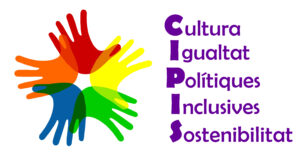
Institut Valencià de Cultura – Conselleria d’Educació, Cultura i Esport

Càtedra Joan Fuster – Universitat de València
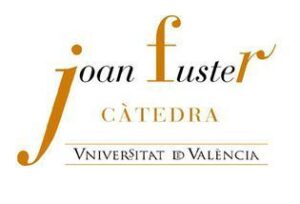
Presentación
En sus escritos críticos, Joan Fuster (1922-1992) consideró una gran variedad de temas literarios y artísticos, entre ellos también la música. Aunque no puede considerarse crítico musical ni musicólogo, los escritos ocasionales sobre música -principalmente artículos en periódicos y revistas- muestran un interés por la música desde una óptica poco común en la época. Fuster escribe en un momento en el que empieza a generalizarse el disco como forma principal de la escucha de musical. También es un momento de reflexión y revival sobre la música antigua y el patrimonio. Y es sobre todo un defensor de la cultura popular y la canción. Las ideas de Fuster sobre música conservan intacto su interés, por encima de las ocasiones específicas de producción y del tiempo que nos separa de su difusión y avanza algunos temas que la musicología puso el foco décadas después. Sus escritos resultan de gran valor para la historia social y cultural de la música en la España del siglo XX. Su testimonio de oyente entusiasta y curioso, poco frecuente en términos comparativos, es una fuente para la musicología que merece la pena considerar.
Horarios
| 16:00 | Presentació a càrrec de Ferran Escrivà Llorca |
| 16:15 | Joan Fuster: reflexió estètica i experiència musical |
| Taula rodona amb la participació de | |
| Francesc Pérez Moragón (Universitat de València) | |
| Anacleto Ferrer Mas (Universitat de València) | |
| Eva Moreda Rodríguez (University of Glasgow) | |
| 17:45 | DESCANS |
| 18:15 | COMUNICACIONS LLIURES |
| Pascual Hernández Farinós. Joan Fuster i Vicent Garcés: una col·laboració reflectida al ballet Marinada | |
| Jorge García. ¿Fuster musicòleg? La relació entre Joan Fuster i Josep Climent | |
| Marcelo Jaume. Una València on els carrers són de plata: cartografiant els límits de la música com a eina de transformació social | |
| Qüestions sobre les comunicacions | |
| 19:15 | Debat final. Modera: Andrea Bombi |
Asistencia
La jornada se llevará a cabo el viernes 18 de noviembre de 2022 por la tarde. La modalidad será presencial en el Espai Cultural de la Facultat de Filologia, Traducció i Comunicació. Universitat de València.
Inscripción
El plazo de inscripción permanecerá abierto hasta el inicio de la jornada. Es necesario realizar un ingreso, traspaso o transferencia bancaria al siguiente número de cuenta:
- Cumplimentar y enviar el Formulario de inscripción
- Abonar la cuota que corresponda
-
- Público en general: 12€
- Socios AVAMUS: gratuito
- Estudiantes: 5€
El plazo de inscripción permanecerá abierto hasta el inicio de la jornada. Es necesario realizar un ingreso, traspaso o transferencia bancaria al siguiente número de cuenta:
ES94 3159 0048 3125 9310 1021 (Caixa Popular)
Es necesario enviar el justificante por correo electrónico a musicologia.avamus@gmail.com
Requena, Música e Historia
29 de abril:
XIX Jornadas AVAMUS/ASREMUS de Musicología
“Asociacionismo: motor social, económico y cultural de la música”
30 de abril: “Arrieta inédito, descubriendo un legado sorprendente”
Fecha: 29-30 de abril de 2023
Lugar: Requena (Valencia) – Sesiones de mañana y tarde
Auditorio de la Sociedad Musical “Santa Cecilia”.
C/ Rafael Bernabeu, 1
46340 Requena (Valencia)
Organizan
AVAMUS – Associació Valenciana de Musicologia
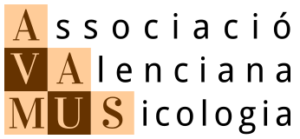
ASREMUS – Asociación Requenense de Musicología

CEFIRE – Conselleria d’Educació, Cultura i Esport

Patrocinan
Fundación “Ciudad de Requena”
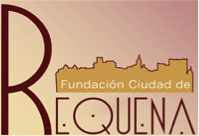
Fundación “Lucio Gil Fagoaga”

Colaboran
Bodega “Sierra Norte”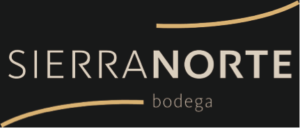
Aguas San Benedetto

Restaurante “El Yantar”

Sociedad Musical “Santa Cecilia”
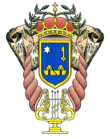
Concejalía de Cultura del M. I. Ayuntamiento de Requena
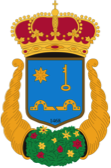
Presentación
Los próximos días 29 y 30 de abril el municipio valenciano de Requena acoge una serie de actos músico-culturales bajo el título “Requena, música e historia”.
Las actividades tendrán lugar en el Auditorio de la Sociedad Musical “Santa Cecilia” e irán dirigidas tanto a personas interesadas en la Musicología y la historia de la música como al público aficionado.
La Asociación Requenense de Musicología (ASREMUS), organiza por segunda vez las prestigiosas Jornadas Avamus de Musicología, por encargo de la Asociación Valenciana de Musicología (AVAMUS). La jornada de esta XIX edición desarrollará ponencias y comunicaciones sobre el tema: “Asociacionismo: motor social, económico y cultural de la música”.
En torno a esta temática, contaremos con la participación de los ponentes: Ramón Sobrino Sánchez (catedrático de Musicología e Historia del Arte de la Universidad de Oviedo), M.ª Luz González Peña (directora del CEDOA, Centro de Documentación y Archivo de la SGAE y experta musicóloga) y Salvador Astruells Moreno (doctor en Musicología y autor de la primera tesis española sobre bandas de música, centrada en la Banda Municipal de Valencia). Así mismo, se han ofertado una serie de comunicaciones que presentarán musicólogos de diversos lugares de España y, en particular, de la Comunidad Valenciana.
Como cierre de la jornada del sábado 29 y enlace con los actos del día 30, podremos disfrutar de un concierto cuyo protagonista será el compositor Emilio Arrieta.
Abrirá la Banda Sinfónica de la Sociedad Musical “Santa Cecilia” de Requena con un concierto denominado “Emilio Arrieta en la música de viento”. A continuación, la soprano Sofía Esparza y el pianista Rinaldo Zhok, ofrecerán un recital-conferencia con canciones para voz y piano del compositor navarro Emilio Arrieta, bajo el título “Canciones para una reina”.
El domingo día 30, la Fundación Lucio Gil de Fagoaga, de Requena, ha organizado unas jornadas con el objetivo principal de dar a conocer el importante patrimonio musical y documental del compositor Emilio Arrieta conservado en su archivo, bajo el título de “Arrieta Inédito, descubriendo un legado sorprendente”.
En la jornada intervendrán, como ponentes: Álvaro Ibáñez Solaz (archivero de la Fundación Lucio Gil de Fagoaga), M.ª Encina Cortizo Rodríguez (catedrática de Musicología de la Universidad de Oviedo y biógrafa de Emilio Arrieta), Rinaldo Zhok (concertista, profesor de piano del Conservatorio Superior de Música de Navarra y experto en la música pianística de Arrieta) y Marcial García Ballesteros (musicólogo y presidente de la Asociación Requenense de Musicología).
Durante el fin de semana, además, se podrá visitar la exposición titulada Arrieta inédito: un patrimonio redescubierto, que pretende dar a conocer el modo en que parte del archivo de Emilio Arrieta llegó a la Fundación Lucio Gil de Fagoaga y los trabajos de restauración y puesta en valor del mismo. Se expondrán documentos originales del compositor navarro y relacionados con su figura.
Las ponencias y comunicaciones de los días 29 y 30 se retransmitirán en directo a través de los canales de YouTube de AVAMUS y la Fundación Lucio Gil de Fagoaga.
Las jornadas “Requena, música e historia” están organizadas por la Asociación Requenense de Musicología, la Asociación Valenciana de Musicología y la Fundación Lucio Gil de Fagoaga de Requena. Cuentan con el patrocinio de la Fundación Ciudad de Requena y la financiación de la Unión Europea dentro del Plan de Recuperación, Transformación y Resiliencia del Ministerio de Cultura y Deporte. Destacar también la participación de la Generalitat Valenciana, a través del servicio de formación del profesorado CEFIRE. Colaboran en la organización la Sociedad Musical “Santa Cecilia”, el Ayuntamiento de Requena y las empresas Bodega Sierra Norte, Agua Mineral San Benedetto y Restaurante El Yantar.
Ponentes
Ramón Sobrino Sánchez
Mª. Luz González Peña
Salvador Astruells Moreno
Programa
Mañana / Matí (Auditorio)
09:00 – 09:30 Acreditaciones y café / Acreditacions i café.
09:30 – 09:45 Presentación Oficial e Introducción / Presentació i Introducció
(Abel Puig, Marcial García, Mª José Martín).
09:45 – 10:00 Presentación de los Ponentes / Presentació dels Ponents.
10:00 – 11:00 RAMÓN SOBRINO SÁNCHEZ: «Asociacionismo Musical en la España del siglo XIX. Las sociedades de conciertos» (título provisional) (50’ + 10’ para preguntas).
11:00 – 11:15 Descanso / Descans (15’).
11:15 – 12:15 M.ª LUZ GONZÁLEZ PEÑA: «Por nuestra libertad se levantaron: La creación de la Sociedad de Autores Españoles (1899)» (50’ + 10’ para preguntas).
12:15 – 12:30 Descanso / Descans (15’).
12:30 – 13:50 Comunicaciones Libres / Comunicacions lliures (15’ + 5’ para preguntas).
12:30 – 12:50 Comunicación 1:
NIEVES MARÍA PELEJERO IBÁÑEZ: «La Sociedad de Conciertos “El Españoleto”: Un ejemplo singular de asociacionismo musical en tierras valencianas».
12:50 – 13:10 Comunicación 2:
DANIEL MARTÍNEZ BABILONI: «Corporativismo y creación colectiva: los compositores españoles ante la transición a la democracia».
13:10 – 13:30 Comunicación 3:
ROBERT FERRER LLUECA y SERGI ARRANDO MÁÑEZ: «L’associacionisme musical a La Vall de Segó: una visió multifocal».
13:30 – 13:50 Comunicación 4:
ABEL PUIG GISBERT: «Organitzacions virtuals i Musicologia en el metavers».
13:50 – 14:00 Descanso / Descans (10’).
14:00 – 16:00 COMIDA / DINAR
Catering en el primer piso de la Sociedad Musical “Santa Cecilia”. Vinos (obsequio de Bodegas Sierra Norte) y agua (obsequio de Aguas de San Benedetto). Exclusivamente para ponentes y participantes que contraten el menú de las Jornadas.
Tarde / Vesprada (Auditorio)
16:15 – 17:15 SALVADOR ASTRUELLS MORENO: «Asociacionismo Musical en Valencia, una visión histórica» (50’ + 10’ para preguntas).
17:15 – 17:20 Descanso / Descans (5’).
17:20 – 18:40 Comunicaciones Libres / Comunicacions lliures (15’ + 5’ para preguntas)
17:20 – 17:40 Comunicación 5:
FREDERIC ORIOLA VELLÓ: «Tres ejemplos de asociacionismo músico-militar en la España isabelina (1847-1856)».
17:40 – 18:00 Comunicación 6:
FRANCISCO CARMONA MONFORT: «La cançó valenciana en les vetlades literàries-musicals de Lo Rat Penat (1880-1909)».
18:00 – 18:20 Comunicación 7:
MARCIAL GARCÍA BALLESTEROS: «Asociaciones valencianas de Amigos de la Música. Las hermanas modestas de las sociedades filarmónicas».
18:20 – 18:30 Descanso / Descans (10’)
18:30 – 18:45 Clausura de las Jornadas / Clausura de les Jornades
18:45 – 19:30 Descanso / Descans (45’).
19:30 – 20:15 CONCIERTO por la Banda Sinfónica de la Sociedad Musical “Santa Cecilia”, de Requena:
«EMILIO ARRIETA EN LA MÚSICA DE VIENTO».
Obras para banda de Emilio Arrieta
20:15 – 20:30 Descanso / Descans (15’).
20:30 – 22:00 CONFERENCIA-RECITAL a cargo de Sofía Esparza (Soprano) y Rinaldo Zhok (Piano):
“CANCIONES PARA UNA REINA”
Obras para voz y piano de Emilio Arrieta
Día 30 de abril
10:00 a 14:00 (Auditorio de la Sociedad Musical “Santa Cecilia”)
Presentación de la Jornada: Luis Robledo Grau, presidente de la Fundación “Lucio Gil de Fagoaga”.
ÁLVARO IBÁÑEZ SOLAZ (Archivero de la Fundación): «El fondo Emilio Arrieta de la Fundación “Lucio Gil de Fagoaga”. Descubrimiento, restauración y descripción. Archivo de la Fundación».
M.ª ENCINA CORTIZO RODRÍGUEZ (Catedrática de musicología de la Universidad de Oviedo y biógrafa de Arrieta): «Perfil biográfico de Emilio Arrieta y dispersión de su patrimonio».
RINALDO ZHOK (Pianista. Profesor del Conservatorio Superior de Música de Navarra): «Joyas y peculiaridades de un patrimonio redescubierto. Música vocal de cámara de Emilio Arrieta».
MARCIAL GARCÍA BALLESTEROS (Musicólogo. Presidente de la Asociación Requenense de Musicología): «Tras la pista de Ildegonda. Orígenes y versiones de una ópera de juventud».
Inscripción
La inscripción y asistencia a las Jornadas es totalmente gratuita (0 €). Solo se requiere rellenar el formulario de inscripción.
- Quien se inscriba en la modalidad 1 a través del CEFIRE, deberá cumplimentar dos formularios: el de inscripción a las Jornadas (A) y el del CEFIRE (B), que le permitirá obtener, si es el caso, el correspondiente certificado.
- Quien se inscriba en el resto de modalidades (público general, miembros de AVAMUS o ASREMUS o estudiantes de cualquier universidad o conservatorio), solo tendrá que rellenar el formulario “A” de inscripción a las Jornadas y seleccionar la modalidad correspondiente.
Para inscribirse en la Jornada, deberá rellenar, según proceda, uno o los dos formularios siguientes:
A) Formulario de inscripción a las Jornadas (en cualquier caso)
(Debido a un problema técnico, algunas preguntas pueden aparecer duplicadas en el formulario, aunque haya que responderlas todas. Rogamos disculpen lans molestias).
B) Formulario de inscripción en el CEFIRE (solo si procede)*
La comida se realizará en el mismo edificio de la Sociedad Musical “Santa Cecilia”. Si desea asistir, deberá indicarlo en el formulario de inscripción. El pago (23 €) se realizará solo en efectivo en el momento de recoger la acreditación de la Jornada.
En general, el plazo de inscripción permanecerá abierto hasta el inicio de la Jornada.
(*) En el caso del CEFIRE, la inscripción finalizará el 18 de abril y el plazo de confirmación, el 26 de abril de 2023.
Comité organizador
Salvador Astruells Moreno
Marcial García Ballesteros
María José Martín Muñoz
Abel Puig Gisbert
Programa
Programa completo de las Jornadas
Enlaces de interés
Carteles de las Jornadas
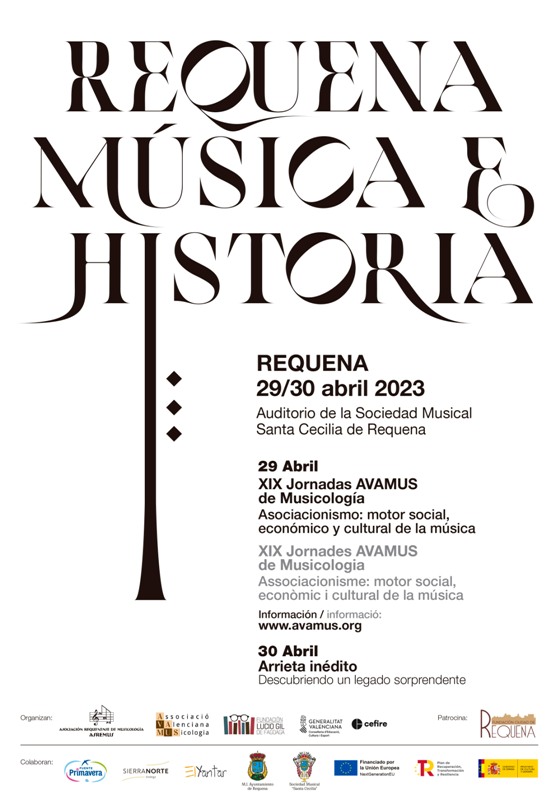
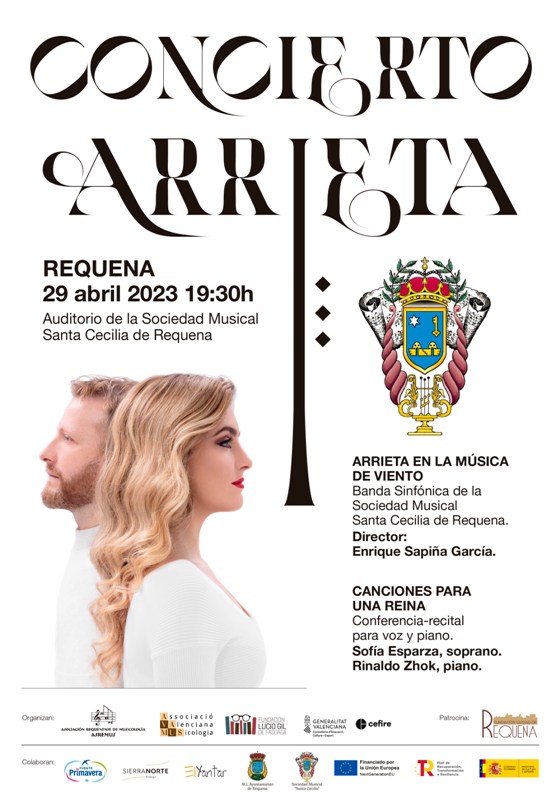
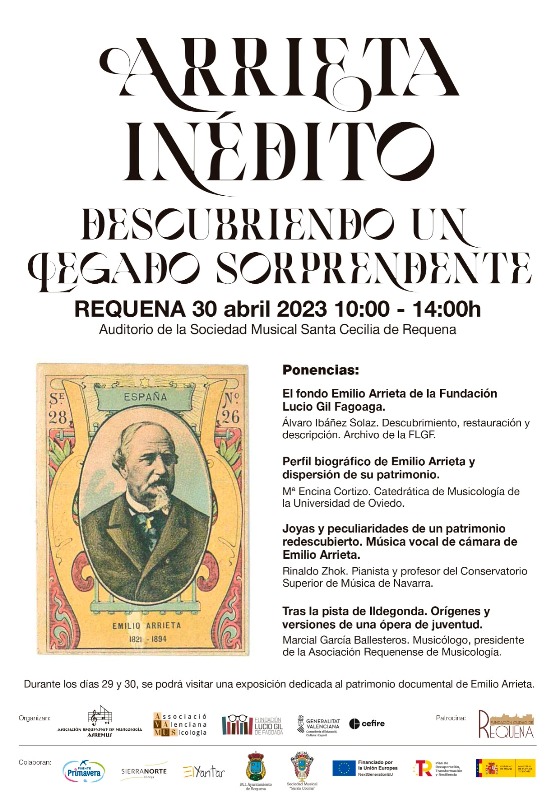
Enlaces a los vídeos de la Jornada
XIX Jornadas AVAMUS/ASREMUS de Musicología (parte I: sesión de mañana)
XIX Jornadas AVAMUS/ASREMUS de Musicología (parte II: sesión de tarde)
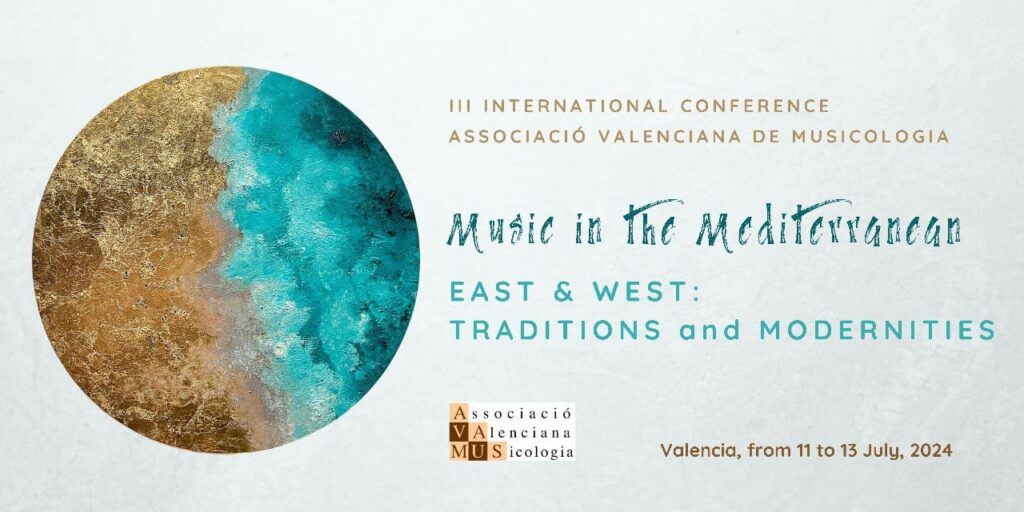
Music in the Mediterranean. East and West: Traditions and Modernities
III International Conference of the Associació Valenciana de Musicologia
Date: July 11–13, 2024
Place: Facultat de Filologia, Traducció i Comunicació de la Universitat de València
Av. de Blasco Ibáñez, 32
46010 València (València)
Sala de graus (1st Floor)
How to get the Campus by public transport:
- Bus: lines 12, 30, 31, 71, 80, 81.
- Metro: line 3, Facultats “stop” or line 5, Aragó “stop”
- Valenbisi: there is a bike stop next to the same University.
Organizers
AVAMUS – Associació Valenciana de Musicologia
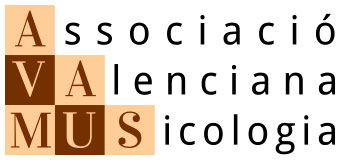
FFTiC – Facultat de Filologia, Traducció i Comunicació

Collaborators
IVC – Institut Valencià de Cultura

IMS – International Musicological Society

Presentation
«Haven’t the peoples of the Mediterranean lived —from the dawn of history to the present day— under the constant threat of volcanoes and earthquakes?».
Fernand Braudel’s rhetorical question alluded to a «boiling geology» that we now know is the result of the clash of the African, Arabian and Eurasian tectonic plates in the Mediterranean.
It is not only nature that fuels disasters. Another fault line —not geological, but human— runs through the Mediterranean, the line of contact between East and West and, at the same time, between the North and South of the world. In this same scenario the daily odyssey of migrants and the periodic outbreaks of violence we are constantly witnessing take place again and again.
On the other hand, Edward Said identified the incipient contemporaneity as the origin of an intellectual framework in which we still tend to interpret these migrations and conflicts today: the Europe of modernisation imagined, in scientific descriptions or in art and literature, the otherness of an exotic East. This image projected its technical supremacy and its will to dominate, as well as the cultural ghosts of earlier times.
But not everything can be reduced to the dynamics of colonial oppression and omnivorous modernisation. With François Jullien, we can make the Mediterranean coincide with what he calls the écart —the hiatus—, the space of an inescapable interlocution between the civilisations that settled on its shores. In a millenary process, these have recognised themselves in the material and immaterial elements of foreign cultures, assuming and assimilating them from their own premises.
In contrast to this model of exchanges and contrasts, the idea of a rigid East/West opposition tends to obscure the reciprocal cultural transfers between the African and Asian shores of the Mediterranean and the European ones, and also neglects the fractures that divided Europe itself: between classes, between different nationalisms, between the different speeds of modernisation in different areas.
In this sense, beneath the geopolitical blocs —even the unifying layer of globalisation— there is a «boiling culture» resulting from centuries of encounter and conflict. Alongside the variety and multiplicity of traditions, a diversity of modernities is recognisable, the fruit of the changing interplay of social and cultural dynamics within the plurality of this Mediterranean world.
Program
The final program of the congress is attached:
Registration Fees
- General fee: 60 €.
- AVAMUS members: 40 €.
- Students: 20 €.
- Students + 1 Year AVAMUS membership fee: 25 €
Registration
To register, you must complete the following form:
Once the corresponding registration fee has been chosen, payment can be made through two methods:
A. Deposit or transfer to the following account number:
ES94 3159 0048 3125 9310 1021 (Caixa Popular)
B. Using the PayPal link on our website:
Proof of income must be attached to the form.
If you are a student you must send proof that proves it.
If you wish to register as a student + AVAMUS fee, contact us by email:
Information of Interest
Languages
The languages of the congress will be: Spanish, Valencian/Catalan, English, Italian and French.
Modality and Format
The congress will be face-to-face. There is also the possibility of enabling some sessions remotely to facilitate the presentation.
Further Information
Speakers
- Dinko Fabris (Università della Basilicata – Universiteit Leiden)
- Salwa El-Shawan Castelo-Branco (Universidade Nova de Lisboa)
- Judith I. Haug (University of Oslo)
Scientific Committee
- Nidaa Abou Mrad (Université Antonine)
- Juan José Carreras López (Universidad de Zaragoza)
- Eduardo Carrero Santamaría (Universidad Autònoma de Barcelona)
- Dinko Fabris (Università della Basilicata – Universiteit Leiden)
- Judith I. Haug (University of Oslo)
- Vassiliki Koutsobina (National and Kapodistrian University of Athens)
- Jacob Olley (University of Cambridge)
Organizing Committee
- Andrea Bombi
- Ramon Canut Rebull
- Ferran Escrivà Llorca
- Nieves Maria Pelejero Ibáñez
- Abel Puig Gisbert
Information in Spanish, Catalan/Valencian, English and Italian
